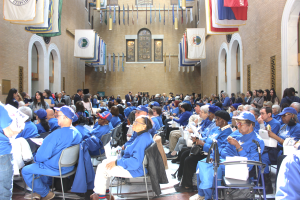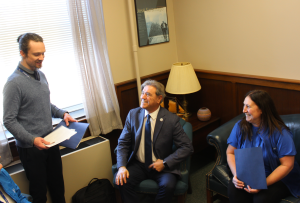“The issues of older people, including myself, have been on the back burner for way too long.”
With these words, Sen. Patricia D. Jehlen fired up 300+ older adults and advocates at a rally for aging-related policy needs at the Massachusetts State House in February.
Jehlen, co-chair of the Joint Committee on Elder Affair
Delays and denials of service are impacting older adults at all levels, she said. “It is inescapable now that those problems exist and there’s also no question those problems exist (due) to the workforce shortage … (and) not paying workers enough.”
Jehlen offered a hypothetical illustration of the lack of care at nearly every step of an individual’s experience.
Imagine a situation, she said, where she, as an older adult, qualifies for homecare services but can’t get them because there is a shortage of workers to meet the demand. With no one to help her, she goes shopping on her own. Coming home, she falls and breaks her hip on the steps.
“I call the ambulance (but) it’s late. It takes a while to get there because there’s a shortage of EMTs,” Jehlen said. “I get to the hospital, (but) the (Emergency Department) is understaffed. I may stay there for hours or days because there’s no room in the hospital because they’re understaffed.”
“I’m (finally) admitted and I’m treated,” Jehlen continued. “(Then) I can’t get out to the rehab facility or the nursing home because they don’t have enough staff.”
“Finally, I get there. I get treated. It’s a little late (and) I don’t get as well as quickly as I could. I’m ready to go home (but) there’s no one to care for me at home because homecare (organizations) are understaffed.”
At every step, workforce shortages impede care and exacerbate problems.
“Those delays and denials of service were made so clear during Covid,” said Jehlen.
In his remarks, Stanley expressed support of the SHINE program which provides Medicare and other counseling to older adults and is an acronym for Serving the Health Insurance Needs of Everyone.
“When those of us that have someone in need of elder care, of senior care, in our family, it often comes and we’re shocked. We’re in emergency mode to get the care,” Stanley said. “Well the SHINE program is there to evaluate and direct families and loved ones on how to care for their…elder family members. And it’s very important that we fully fund that program.”
Stanley also praised the state’s housing bond bill which, he said, includes a section that establishes a commission on making Massachusetts a housing friendly state.
“This commission will bring together a diverse set of stakeholders to recommend comprehensive strategies, and how to expand their supply of affordable, supportive, senior housing for all older adults,” said Stanley.
Emceed by AARP state director Mike Festa, Lobby Day was organized and led by Mass Home Care, the advocacy arm of the state’s 20+ aging services providers. The crowd included representatives from more than a dozen aging organizations including Coastline Elderly Services in New Bedford.

Betsy Crimmins, executive director of Mass Home Care said it was amazing to see the sea of blue in the room.
“Although so many of us work at different entities in the aging network, we are all part of the nonprofit…aging services network of Massachusetts which recognizes the importance of older adults and people with disabilities being able to make informed, dignified choices about the care they receive and the settings in which they receive their care,” she told participants. “We want to make sure that all of us, our family members (and) the people we care about, have access to a knowledgeable, kind, caring person who will sit with us, listen to us, and inform us about our choices and not have choices made for us by a for-profit entity using algorithms, or formularies or artificial intelligence because, as we know, whether we like it or not that’s the way our healthcare system is already rapidly moving. And our social care system cannot follow. It’s too important what we do.”
“The event today is not the start and end of what we need to do,” she continued. “We’ve got to redouble our efforts to let anyone who will listen to us know the value of what you do day in and day out.”

Recent Comments